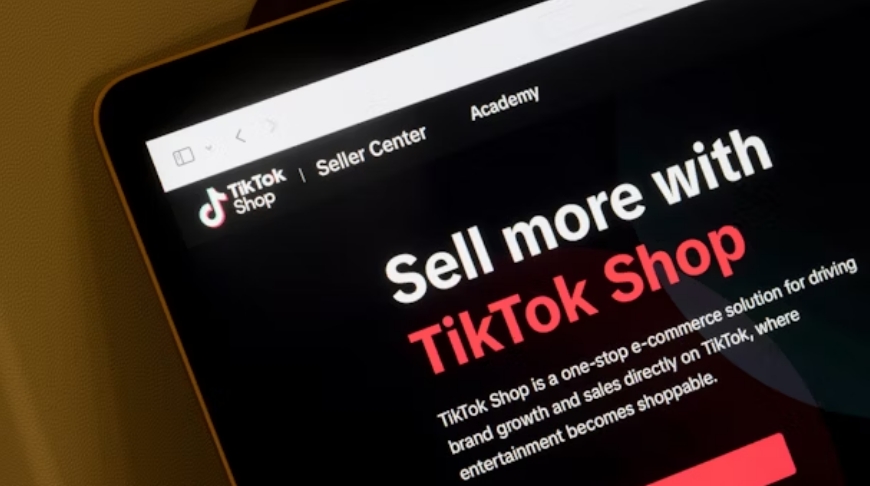Could TikTok’s big bet on commerce insulate the platform against the threat of a US ban?
The rapid ascent of TikTok Shop could further entrench the uber-popular video-sharing app into the US economy – and win over brand spend and creator loyalty in the meantime.

TikTok is going all in on its ecommerce business in the US as the company faces growing regulatory pressure / Adobe Stock
TikTok is going all in on commerce. What was just months ago a part of the company’s broader growth strategy, TikTok Shop has now become a focal point for the social platform, which today boasts over a billion monthly active users.
Purchases on TikTok Shop grew 13% between April and May of this year – compared to a previous month-over-month average lift of 7% since the beginning of 2024, according to new data from Route, which offers package tracking and shipping protection for more than 13,000 brands. TikTok Shop’s peak this year is already 188% higher than when the tool debuted in the US on September 12 of last year.
And while some users have responded negatively to the influx of sponcon and selling happening on the app – which has built a reputation rooted in creator-led authenticity – TikTok’s user base has remained highly engaged as the company branches into commerce. More than 90% of US TikTok users who noticed a change in shopping content after the rollout of TikTok Shop reported either an increase or no change in their usage, according to research by eMarketer.
“We have seen the stunning rise in interest in TikTok as a platform for ecommerce,” says Beatrice Quarshie, head of paid social at Nest Commerce, a performance marketing agency for ecommerce brands. In its shift from “social media to entertainment and social commerce,” Quarshie says, the platform has “successfully brought its audience on that journey.”
Users may have accepted the shift because in many ways, it simply built on the content production and consumption habits inherent to the app. Brands strike deals with creators to organically promote their products and services – and most audiences don’t mind.
“In many ways, TikTok productized and supercharged organic behavior on the platform” with TikTok Shop, says Jasmine Enberg, a principal analyst at eMarketer specializing in social media.
Today, to support the rapid growth of its commerce capabilities, the company is aggressively hiring for TikTok Shop roles in the US market – spanning functions from content and creator partnerships to user rights and governance policy – according to current LinkedIn job postings.
The platform reportedly suspended plans to expand its ecommerce business in Europe late last month to focus on the US market. It’s a somewhat risky strategy, considering that TikTok is under the gun in the US market thanks to a controversial law passed in April that will force ByteDance, the Chinese parent company of TikTok, to divest the app within a year or face a nationwide ban in the US.
Go big or go home – or go big and go home?
Whether a gung-ho push into commerce will help or hurt TikTok’s prospects of facing a ban in the US remains a question of debate.
On one hand, a highly successful ecommerce business may help bolster the app’s position in the US market – making it a more appealing offering to potential investors. “The clock is already ticking for TikTok to find a divest or be banned, and there are indications that TikTok is working hard to reach profitability in order to be more attractive to potential buyers, should it come to that,” says Enberg.
Plus, as Thomas Walters, the Europe CEO of influencer marketing agency Billion Dollar Boy, points out, TikTok knows how integral it is to brands, small businesses and creators – so the expansion of its ecommerce offerings is likely to garner greater support among these cohorts. “If more brands, creators and businesses start to benefit more from the platform, TikTok could rally more support for their fight against the ban, which could be a potential strategy,” he says.
But that strategy could also prove a double-edged sword. “Of course, the further TikTok entrenches itself in the US economy, the more ammunition it provides to lawmakers who want to see the app banned or sold,” Enberg says.
The possibility is echoed by Walters. “The US government may view this strategy [of expanding TikTok Shop] as funneling more funds to a company that they don’t want operating in the US, potentially escalating their interest in removing the platform in the US,” he says.
The company is, of course, already fighting the divest-or-ban bill. Before it was signed into law by President Biden, the company urged its users to call their representatives and advocate against the bill’s passage (which ironically may have only reinforced lawmakers’ concerns about the app’s potential to exert political power in the US).
Then, after the bill passed, TikTok quickly filed a lawsuit against the US government, alleging that the bill violates Americans’ First Amendment rights by potentially restricting the free expression of the app’s 170 million monthly US users.
Brands and creators won’t soon abandon ship
Despite the looming threat of a ban, most experts believe that investment from brands and creators in TikTok Shop will continue to grow in the coming months.
“It’s a new sales channel for brands that blends community, creativity and commerce, making it successful in its early start. And for brands, especially in the beauty and retail industries, TikTok Shop is an additional revenue channel driving sales,” says Walters. “Brands will gravitate towards platforms and tools that are working right now and if TikTok Shop is working for them, brands will continue using it despite the ban threat.”
He suspects that many brands using TikTok Shop today already have “strategies in place” in the case that TikTok is banned in the US.
And while TikTok Shop launched with gimmicky, drop-shipped products á la Temu, it has since gained enough momentum to entice bigger, more established brands.
Samantha Zink, the CEO and founder of influencer talent agency Zink Talent, points to PacSun as a primes example – while the apparel retailer has historically focused on creator collaborations on Instagram, it’s now turning to TikTok Shop “to drive sales and maintain relevance,” she says.
“Brands recognize that TikTok Shop offers a high return on investment through targeted collaborations with top-selling creators. Despite the threat of a potential ban, the platform’s proven success in generating sales keeps brands interested and engaged,” she adds.
Of course, brands’ investment strategies on the platform will be informed by a variety of factors – and many brands remain unsure of TikTok Shop’s potential value. “While many creators and small businesses have been highly successful on the platform, sales can be volatile and unpredictable,” Enberg says. “That’s one reason that many established brands, who already have multiple sales channels, have been hesitant to join, along with the regulatory concerns and perception issues due to some of the low-quality, inexpensive goods sold on TikTok Shop.”
Then again, one brand’s hesitance might be another brand’s golden opportunity, Quarshie argues: “The risk of a ban is likely to put off more conservative brands. However, this opens up an opportunity for more savvy brands to succeed – as if your competitors are investing elsewhere out of fear, this will make the platform more cost-effective.”
And as for creators – many of whom are cashing in majorly on TikTok’s burgeoning commerce business – are largely unlikely to ditch TikTok Shop anytime soon. “Many influencers [see] substantial earnings through commissions, especially compared to other platforms like Amazon, where the percentage is much lower,” Zink explains. “TikTok’s algorithm supports these creators by promoting their content, which leads to viral videos and increased earnings. This win-win scenario has made TikTok an attractive platform for influencers, fostering a positive environment for creator growth and engagement.”
Enberg sums it up succinctly: “As long as there are users on the platform and there is money to be made, brands and creators will stick around, respectively.”
Could TikTok Shop unseat Amazon and other ecomm titans?
The explosion of TikTok Shop has also helped establish the platform as a formidable competitor to incumbent ecommerce giants like Amazon, Temu, Alibaba and Shein. Amazon’s share of combined Amazon and TikTok orders for users who shop on TikTok Shop dropped from 65% in Q4 2023 to 61% in Q1 2024, per Route data.
Not only does TikTok Shop manage its own fulfillment and logistics services, helping to get orders to consumers doorsteps sooner – a key reason for Amazon’s astronomical market success – but TikTok also offers something that Amazon and most other ecommerce players don’t: an infrastructure designed for discoverability.
At its heart, TikTok is still an entertainment platform – users come to the app to explore and be inspired. And now, by fully integrating the path to purchase within this entertainment ecosystem, users can shop seamlessly within the app. Sprinkle in TikTok’s infamously powerful content recommendation algorithm, and voila: TikTok Shop has an indisputable edge over commerce competitors like Amazon and Temu.
“Consumers can quickly purchase products they see in videos with just a few clicks. This ease of use, combined with targeted advertising, makes TikTok Shop highly effective,” Zink says. “While platforms like Amazon require multiple steps to complete a purchase, TikTok Shop streamlines the process, making it more user-friendly. Additionally, the platform’s integration with influencers creates a unique shopping experience that feels organic and trustworthy. This differentiator positions TikTok Shop strongly against other ecommerce giants.”
This is not to say that TikTok couldn’t take a page from Amazon’s playbook. “On TikTok, shopping is fueled by discovery, inspiration and FOMO, while on Amazon, it’s intent-driven and fueled by convenience and product selection. Amazon has never mastered the discovery-driven shopping experience that TikTok has, and TikTok has work to do to combine its prowess in discovery with more intent-based shopping,” says Enberg. She sees both as important experiences in the commerce landscape, and emphasizes that the path to purchase is rarely linear.
A sunny forecast for TikTok Shops
Of course, TikTok still faces the tough task of striking the right balance between commerce-driven content and pure entertainment. The long-term success of TikTok Shop will require that it effectively engages brands and creators – while avoiding oversaturating users with promotional content, which could repel those seeking purely entertainment-based interactions.
“There’s been some consumer feedback about over-promotion of social commerce content on TikTok, which is valuable feedback for TikTok Shop as it grows,” says Walters. But at the same time, he notes that “consumers will also grow used to [seeing TikTok] as a shopping platform.”
Though it won’t be an easy needle to thread, experts are generally bullish on the future of TikTok Shop.
“As TikTok has shifted towards more of a commerce model, it needs to continue investing and innovating to keep user engagement high, supporting brands. The focus should be on integrating entertainment and shopping … TikTok Shop will be a key plank in this strategy. As long as the user experience is smooth, this investment in TikTok Shop can only help the platform,” says Nest Commerce’s Quarshie.
Zink, an authority on influencers, sees TikTok Shop’s trend line going up and to the right. “The platform’s ability to attract and reward influencers, combined with its user-friendly shopping experience, sets it up for ongoing success,” she says. “We can expect TikTok Shop to expand its offerings, potentially including more high-end and designer brands. As it continues to refine its strategy and attract bigger names, TikTok Shop is likely to solidify its position as a leading ecommerce platform.”
And as for brands, businesses and creators wary of the risks involved, some things just aren’t likely to change. “TikTok already has a perception problem,” says Enberg, “and it’s unlikely that any increased investments are going to meaningfully change how people view the platform, either for good or bad.”
文章来源:thedrum

TKFFF公众号
扫码关注领【TK运营地图】

TKFFF合作,请扫码联系!







 闽公网安备35021102002035号
闽公网安备35021102002035号